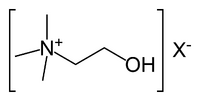Assessment |
Biopsychology |
Comparative |
Cognitive |
Developmental |
Language |
Individual differences |
Personality |
Philosophy |
Social |
Methods |
Statistics |
Clinical |
Educational |
Industrial |
Professional items |
World psychology |
Biological: Behavioural genetics · Evolutionary psychology · Neuroanatomy · Neurochemistry · Neuroendocrinology · Neuroscience · Psychoneuroimmunology · Physiological Psychology · Psychopharmacology (Index, Outline)

Choline
Choline is a nutrient, essential for cardiovascular and brain function, and for cellular membrane composition and repair.
History
Choline was discovered by Andreas Strecker in 1862 and chemically synthesized in 1866. In 1998 choline was classified as an essential nutrient by the Food and Nutrition Board of the Institute of Medicine (U.S.A.) and Adequate Intakes (AI) have been established.
Chemistry
Choline is a quaternary saturated amine with the chemical formula
where X− is a counterion such as chloride (see choline chloride), hydroxide or tartrate.
Physiology
Choline and its metabolites are needed for 3 main physiological purposes: structural integrity and signaling roles for cell membranes, cholinergic neurotransmission (acetylcholine synthesis), and as a major source for methyl groups via its metabolite, trimethylglycine (betaine) that participates in the S-adenosylmethionine synthesis pathways.
When choline is metabolized by the body, it may form trimethylamine, a compound with a fishy odor. Hence, when large amounts of choline are taken (such as 10-16 grams/day as a dietary supplement), the person may suffer from a fishy body odor.
Choline as a Supplement
The Food and Drug Administration (FDA) requires[1] that infant formula be made from cow's milk containing choline.
Choline has also found its way into nutritional supplements which claim to reduce body fat; but there is little or no evidence to prove that it has any effect on body fat whatsoever.
Sources
The foods richest in phosphatidylcholine -- the major delivery form of choline -- are beef liver, egg yolks and soy. Beef liver, iceberg lettuce, peanut butter, peanuts, sunflower seeds, and cauliflower are some foods that contain free choline. In 2004 USDA has released its first database of the choline content in common foods [2].
The best absorbed choline supplement is lecithin from soy or egg yolk. When scientists at Central Soya Corporation added lecithin/choline supplement to rat chow during the first trimester of pregnancy the supplemented offspring had genius memory compared to rats who did not receive the choline supplement. The effect was lifelong. The effect was traced to enhancement of a part of the brain called the hippocampus.
It is well established that supplements of methyl group transfer vitamins B6, B12, folic acid reduce the blood titer of homocystine and prevent heart disease. Choline is a necessary source of methyl groups for methyl group transfer. Supplements of lecithin/choline by Central Soya scientists reduced heart disease in laboratory studies. The reduction in heart disease with lecithin supplements may however relate more to the cholesterol carrying capacity of lecithin than to the methyl group transfer role of choline.
External links
- PDRhealth Choline Description
- An interview about Choline with Steven Zeisel, Editor-in-Chief of the Journal of Nutritional Biochemistry
- USDA Database for the Choline Content of Common Foods
de:Cholin fr:Choline lt:Cholinas nl:Choline
| This page uses Creative Commons Licensed content from Wikipedia (view authors). |